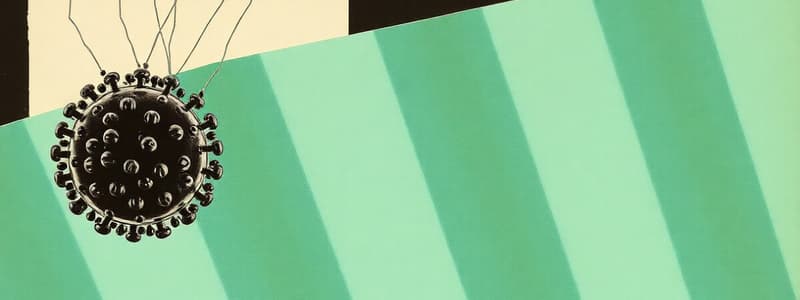Podcast
Questions and Answers
What mechanism does endocytosis utilize to transport drugs into the cell?
What mechanism does endocytosis utilize to transport drugs into the cell?
- Facilitated diffusion using specific carriers
- Simple diffusion across the lipid bilayer
- Active transport through protein channels
- Engulfment of drug molecules by the cell membrane (correct)
How does the pH at the absorption site influence drug absorption?
How does the pH at the absorption site influence drug absorption?
- It alters the physical state of the drug molecules.
- It determines the ratio of charged to uncharged drug forms. (correct)
- It affects the heat stability of the drug molecules.
- It changes the lipid solubility of the ionized forms.
In the context of drug permeability, which statement is true for weak acids?
In the context of drug permeability, which statement is true for weak acids?
- Only the ionized form can enter the bloodstream.
- Both forms pass through membranes equally well.
- The uncharged form can pass through membranes more readily. (correct)
- The charged form can permeate through membranes effectively.
What is required for the effective use of the Henderson-Hasselbalch equation?
What is required for the effective use of the Henderson-Hasselbalch equation?
Which type of kinetics is exhibited by drug transport via carrier systems?
Which type of kinetics is exhibited by drug transport via carrier systems?
What is the main driving force for passive diffusion of drugs across membranes?
What is the main driving force for passive diffusion of drugs across membranes?
Which process does not require energy for drug transport?
Which process does not require energy for drug transport?
What occurs during the distribution phase in pharmacokinetics?
What occurs during the distribution phase in pharmacokinetics?
What type of transport is characterized by carrier proteins that change shape?
What type of transport is characterized by carrier proteins that change shape?
Which type of drug transport requires energy?
Which type of drug transport requires energy?
Which phase of pharmacokinetics involves the removal of the drug from the body?
Which phase of pharmacokinetics involves the removal of the drug from the body?
What is the primary characteristic of lipid-soluble drugs in relation to biological membranes?
What is the primary characteristic of lipid-soluble drugs in relation to biological membranes?
Which of the following processes can become saturated?
Which of the following processes can become saturated?
Flashcards
Pharmacology
Pharmacology
The science that studies the effects of drugs on living organisms, including how they are absorbed, distributed, metabolized, and eliminated from the body.
Pharmacokinetics
Pharmacokinetics
The study of how the body processes a drug, including absorption, distribution, metabolism, and excretion.
Drug Absorption
Drug Absorption
The process by which a drug enters the bloodstream from its site of administration.
Drug Distribution
Drug Distribution
Signup and view all the flashcards
Drug Metabolism
Drug Metabolism
Signup and view all the flashcards
Drug Elimination
Drug Elimination
Signup and view all the flashcards
Passive Diffusion
Passive Diffusion
Signup and view all the flashcards
Facilitated Diffusion
Facilitated Diffusion
Signup and view all the flashcards
Active Transport
Active Transport
Signup and view all the flashcards
Endocytosis
Endocytosis
Signup and view all the flashcards
Drug Ionization
Drug Ionization
Signup and view all the flashcards
pH and Drug Absorption
pH and Drug Absorption
Signup and view all the flashcards
Lipid Solubility and Equilibration
Lipid Solubility and Equilibration
Signup and view all the flashcards
Study Notes
Pharmacology
- The science that deals with drugs.
Pharmacodynamics of Drugs
- Drug actions
- Mechanism of action
- Adverse effects of drugs
Pharmacokinetics of Drugs
- Absorption, distribution, metabolism, and excretion of drugs
Drug Absorption
- The transfer of a drug from its site of administration to the blood stream.
Mechanisms of drug transport across cell membranes
1. Passive Diffusion
- The driving force for passive absorption is the concentration gradient across a membrane.
- The drug moves from a region of high concentration to one of lower concentration.
- The majority of drugs gain access to the body via this mechanism.
- Lipid-soluble drugs readily cross biological membranes due to their solubility in lipid bilayers.
2. Facilitated Diffusion
- Other agents can enter the cell through specialized transmembrane carrier proteins.
- These proteins undergo conformational changes allowing the passage of drugs or endogenous molecules into the interior of cells.
- The process moves molecules from an area of higher concentration to one of lower concentration.
- The process does not require energy and can be saturated.
3. Active Transport
- This mode of drug entry involves specific carrier proteins across the membrane.
- Some drugs closely resembling naturally occurring metabolites are actively transported across cell membranes by these specific carrier proteins.
- Active transport is energy-dependent and driven by the hydrolysis of adenosine triphosphate (ATP).
- Active transport moves drugs against the concentration gradient (from low to high drug concentration).
- The process shows saturation kinetics.
4. Endocytosis
- This type of drug delivery transports drugs of exceptionally large size across cell membranes.
- Endocytosis involves engulfment of a drug molecule by the cell membrane and transport into the cell by pinching off the drug-filled vesicle.
- For example, vitamin B is transported across the gut wall by endocytosis.
Effect of pH on drug absorption
- Most drugs are either weak acids or weak bases.
- Acidic drugs (HA) release H+ ions, causing a charged anion (A).
- Basic drugs are usually charged; loss of a proton produces the uncharged base (B).
- An uncharged drug passes through membranes more readily than a charged drug.
- For weak acids, the uncharged HA permeates through membranes; the charged A does not.
- For weak bases, the uncharged B penetrates through cell membranes; the charged BH+ does not.
- The effective concentration of the permeable form of each drug at its absorption site is determined by the relative concentrations of charged and uncharged forms.
- The ratio between the two forms depends on the pH at the site of absorption and the pKa. (Henderson-Hasselbalch equation)
Studying That Suits You
Use AI to generate personalized quizzes and flashcards to suit your learning preferences.




